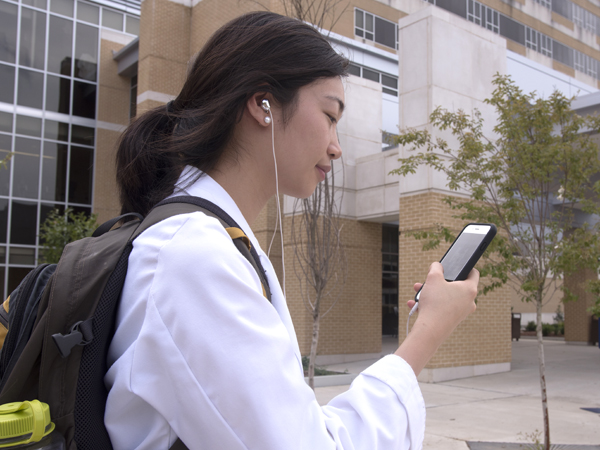Headlines
UMMC: Hearing Today Can Be Gone Tomorrow

Second-year University of Mississippi School of Medicine student Cathy Chen uses earbuds to listen to music on her cell phone.
Photo courtesy UMMC
Mississippians love their personal listening devices – be it a cell phone in hand, a tablet or computer, or a digital music player – and the earbuds that blast the beat directly into their heads.
But with a maximum volume that can reach 110 decibels, such devices can cause irreversible hearing damage with lifelong repercussions, experts at the University of Mississippi Medical Center say. Ditto for single loud bursts of sound from other sources, such as a gunshot, or prolonged exposure to other loud noise.
Noise levels are measured in decibels. According to the American Speech-Language Hearing Association, sounds louder than 85 decibels have potential to cause permanent hearing loss, whether it’s a single loud blast or prolonged exposure.
Firearms or a jet engine can produce 150 decibels or greater, as can fireworks. An ambulance’s siren is 120 decibels; the volume at concerts and music festivals reaches about 110 decibels, the National Institutes of Health says. An exposure over 85 decibels can damage hair cells, or sensory receptors, in the inner ear.
“One loud, intense noise can cause damage, and that damage is permanent,” said Dr. Christopher Spankovich, a UMMC audiologist and associate professor of otolaryngology and communicative sciences. “But, prevention is key. We can reduce risk by limiting exposure to loud sounds, maintaining safe distances, and using hearing protection devices.”
One example: “When you’re shooting a gun, it can be a brief exposure – three milliseconds – but very intense,” Spankovich said.

Spankovich surveys fireworks that, if detonated close to a person, can cause hearing loss.
Photo courtesy UMMC
parents whose worries are focused on other safety issues. Those attending loud concerts or noisy sporting events should always use hearing protection such as earplugs or sound-blocking earmuffs, Spankovich said.
And when it comes to fireworks, “you can have a double whammy,” said Dr. Mark Reed, professor of otolaryngology and pediatrics and chief of the Division of Pediatric Otolaryngology. “If it’s close enough to cause hearing loss, it’s probably going to give you a burn.
“It’s the accidental firework that goes off near your ear that will get you in trouble,” he said. “It could be like a gunshot, or any loud brief noise.”
In his field, Spankovich said, “we see a lot of young people with evidence of hearing loss.” A cross-section study found that 16 percent of U.S. children, or about five million, are in that group. “The louder a sound is, the shorter the duration that you can safely be exposed to it,” he said.
Hearing loss for all people can be subtle and cumulative, he said. He encourages parents to talk to their children about how hearing loss occurs and its consequences in a society where many use personal listening devices to enjoy music on the go.
“A parent can limit how loud music is for their child by going into the settings on the listening device,” Spankovich said. He encourages parents to learn more about what noise levels are safe, or can adversely affect their child, by visiting the website http://www.noisyplanet.nidcd.nih.gov/Pages/Default.aspx.
Hearing protection devices, when used correctly, can help block out dangerous sounds but still allow the wearer to enjoy activities that produce a great amount of noise, Spankovich said. Foam earplugs should be inserted deeply enough into the ear canal so that they can expand, blocking out the most harmful noise. “If the foam plug is sticking out, you’re not getting protection,” he said.
“By far, one of the most common recreational reasons to wear earplugs is when you are shooting firearms,” Reed said. “If one is right-handed, you would typically shoot a rifle off your right shoulder, and that usually puts your left ear at risk. We always ask people who are right-handed and have left-ear hearing loss if they shoot a lot of guns.”
“People don’t like to wear earplugs to sporting events or concerts because they want to be part of the experience,” Spankovich said. “But, there are musicians’ earplugs that are commercially available that have a slightly lower noise reduction than traditional hearing protection, and a filter that better mimics natural hearing so music sounds like it should.”
When adults and children are exposed to loud sounds, they can have diminished understanding of speech and sound, such as difficulty following a conversation because of high-frequency hearing loss. “There can be loss of clarity and understanding,” Spankovich said.
They can also start having ringing, buzzing or humming in their ears caused by no external source, called tinnitus. “It can be annoying, and it can be 24/7,” Spankovich said. In children, it can affect academic performance because sounds are muffled or simply not heard.
“That’s one of the most common reasons we see bilateral hearing loss in children or adolescents who previously had normal hearing,” Reed said of the use of iPods or other devices that require earbuds. “To develop hearing loss, you can be exposed to a really loud sound over a short period of time, or a somewhat loud sound over a longer period of time. The result is the same.”
Audiologists can offer counseling and devices that can help a person cope with hearing loss, Spankovich said. “But, we can’t regrow the neural fibers of the auditory system,” he said. “We can bring sound to the deaf or hard of hearing with hearing aids and cochlear implants, and greatly improve communication, but we can’t restore normal hearing.”
Spankovich suggests anyone exposed to a loud burst of sound who is experiencing ringing, buzzing or muffling noises see an audiologist to determine if damage has been sustained.
Audiologists are trying to shift attitudes about noise and raise awareness that people can unwittingly suffer permanent hearing loss, Spankovich said.
“Today’s adult population grew up during a time of rock concerts, where they wanted to turn up the volume,” he said. “We’re trying to change that perspective. Louder is not necessarily better.”
Story and photos courtesy University of Mississippi Medical Center












































